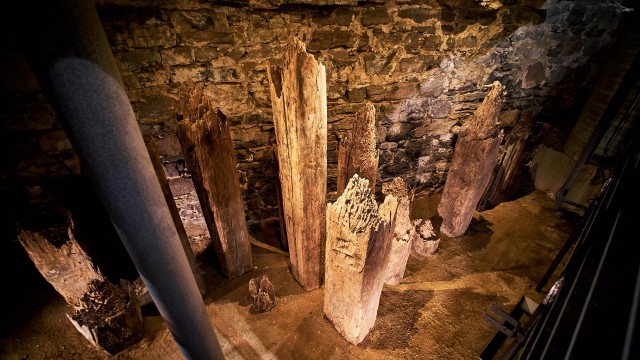Tales of Montréal

Tales of Montréal is a must-see activity featuring the five periods of occupation of pointe à Callière, the point of land where the city was founded and built over time by generations of Montrealers. Thanks to the dynamic and participatory approach of our expert guides, young people will experience a memorable encounter with the men and women who chose to start a new life in Montréal with courage and resourcefulness. A unique and tangible way to discover the evolution of one’s city!
What will the students do at the Museum?
- Examine and compare different objects to make links between historical periods, archaeological layers and different lifestyles.
- Look for and identify the traces of different buildings unearthed during archaeological digs under Montréal’s former Marketplace.
- Imagine life at different times, by examining models showing how the Pointe à Callière site changed from the 14th to the 19th centuries.
- Meet virtual historical figures, thanks to advanced technological projections.
Concepts covered during the tour
- Archaeology: stratigraphy, remains, artefacts.
- History and ways of life: land use, cultural phenomena, economic activities, trade, means of transportation, lines of communication, immigration, canals, fortifications.
Competencies developed
The activities on this interpreted tour are in line with the aims of the Quebec education programs and help develop the following competencies.
In Quebec
Geography
The urban territory (the Metropolis) (Cycle 1)
- Understand the organization of a territory.
History and Citizenship Education
European expansion in America: Native populations (Cycle 1)
History from the 14th century to the 19th century (through changes that took place in Montréal) (Cycle 2)
- Examine social phenomena in a historical perspective:
- Consider social phenomena in terms of duration;
- Assess the complexity of social phenomena.
History
- Recognize, from a historical perspective, the fundamental characteristics of Western civilization (through changes that took place in Montréal from the 14th century to the 19th century).
In Ontario
Canadian and World Studies
Geography, Grade 9
- Analyze the principal demographic characteristics and patterns of human settlement in Canada (through the example of Montréal, from the 14th century to the 19th century).
History of Canada, identity and culture, Grade 12
- Analyze the impact of significant events and of major political, economic, and social issues on the development of Canada (through the example of Montréal, from the 14th century to the 19th century).
Our experienced interpreter-guides know how to adapt the tour to students’ ages and interests. Come experience Montréal’s history, right where it all began!
Information and reservation
Please fill out our online form and we will contact you shortly to complete your reservation.
For any assistance:
[email protected]
514 872-9127
Please note that we cannot guarantee a booking request made less than 4 weeks in advance.
Hours and rates of visits and group activities (taxes included)
September 2024 to April 2025
Tuesday to Friday, 9:30 am to 5 pm
May-June 2024
Tuesday to Friday, 9:30 am to 5 pm
+ Mondays June 2, 9 and 16, 2025 (subject to change without notice)
Role of accompanying adults
Divide the group into smaller sub-groups according to the number of groups specified on your reservation. The number of groups required corresponds to the number of accompanying adults required during the visit.
Follow the group at all times to maintain discipline and manage particular cases. The mediator or guide will lead the visit. Accompanying adults must stay with and supervise the group during lunch time.
One-day package
Add a workshop or visit and enjoy a full day at Pointe-à-Callière:
Lunch room
A lunch room is available for groups.
Reservations required.
Access to the Museum
Consult instructions.
There is free bus parking on de la Commune Street, at the corner of Place Royale.
